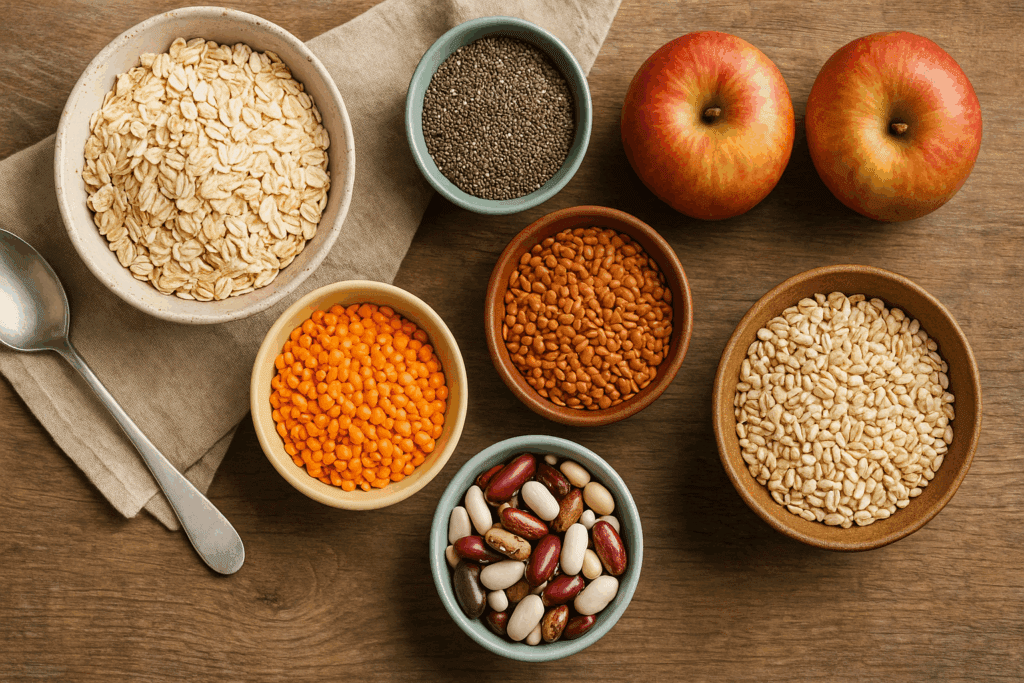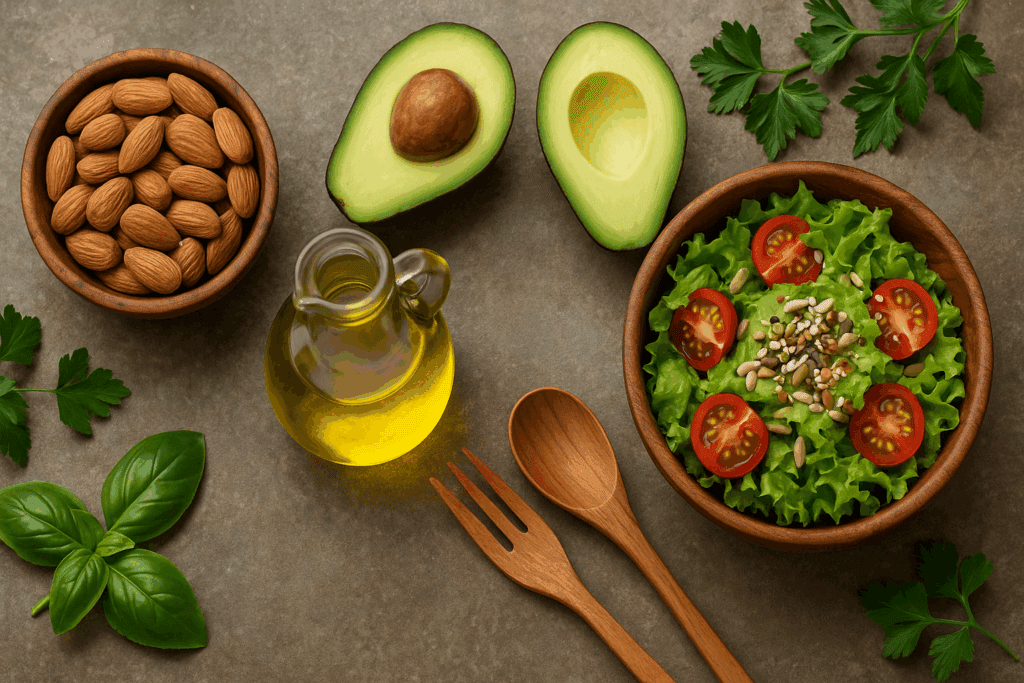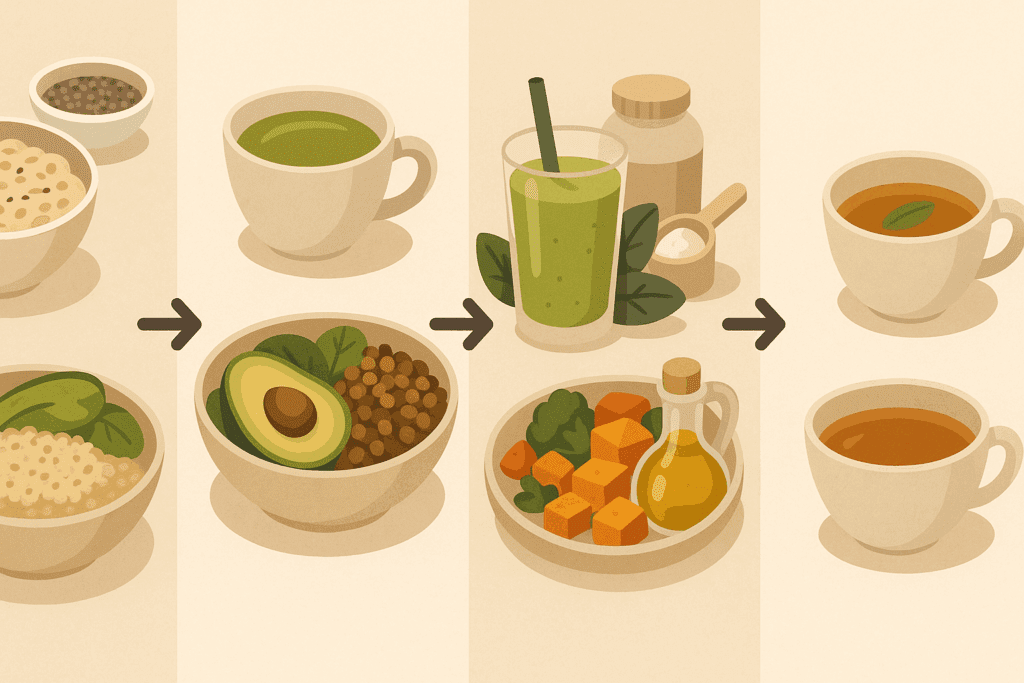In a world where food is available around every corner and our lives are often defined by busy schedules and stress, it’s no wonder appetite control has become a central concern in modern health and nutrition. Whether you’re trying to lose weight, prevent overeating, or simply gain more control over your hunger cues, learning natural ways to suppress appetite offers a safe, sustainable, and science-backed path forward. Rather than relying on harsh stimulants or synthetic appetite suppressants, many individuals are turning to natural appetite suppressant foods, functional herbs, and appetite-balancing teas that work with the body’s systems to promote satiety and reduce cravings.
Understanding which foods that suppress hunger are most effective—and why—requires a deeper look into the physiology of appetite. Our bodies rely on a complex interplay of hormones and neurotransmitters that regulate hunger, fullness, digestion, and energy balance. Ghrelin, often referred to as the “hunger hormone,” is produced in the stomach and stimulates appetite, while leptin and peptide YY communicate satiety and help reduce food intake. Disruptions in these signals, often caused by poor dietary choices, lack of sleep, chronic stress, or irregular eating habits, can lead to an increase in cravings and difficulty managing portion sizes. Fortunately, by strategically incorporating natural foods that curb appetite, herbs that suppress appetite, and drinks that suppress appetite into your daily routine, you can take meaningful steps toward regaining balance.
You may also like: How Mindful Eating Habits Can Help You Make Healthier Food Choices: Expert Tips for Conscious Nutrition and a Balanced Lifestyle

Fiber and Fullness: The Foundation of Natural Appetite Suppressant Foods
When it comes to long-lasting fullness, fiber-rich foods are one of nature’s most powerful tools. Soluble fiber, in particular, absorbs water in the digestive tract and forms a viscous gel, which slows down gastric emptying and promotes the release of satiety hormones. This process leads to a gradual and sustained feeling of fullness, reducing the likelihood of overeating later on.
Foods such as oats, chia seeds, lentils, flaxseeds, beans, apples, and barley are among the top natural appetite suppressant foods due to their high fiber content and ability to blunt hunger. Including these ingredients in daily meals helps regulate blood sugar and insulin response, which in turn can decrease appetite over time. These foods that suppress appetite not only offer satiety benefits but also support gut health by feeding beneficial bacteria in the microbiome—another factor that influences hunger regulation.
Eating a fiber-rich breakfast or snack is particularly effective. For example, overnight oats with chia seeds or a chickpea salad with avocado offers a perfect mix of fiber, healthy fats, and protein—three elements that work synergistically to act as foods that cut appetite while delivering essential nutrients. Over time, this kind of consistent nourishment can lead to a natural reduction in hunger, fewer cravings, and improved dietary adherence.

Harnessing Protein to Naturally Shrink Appetite
Protein plays a pivotal role in hunger regulation. Compared to carbohydrates or fats, protein is more satiating per calorie, meaning it creates a greater sense of fullness with fewer calories consumed. This makes it one of the most reliable natural ways to suppress appetite, particularly for individuals trying to manage their weight or reduce frequent snacking.
Foods like tofu, tempeh, quinoa, edamame, and lentils are examples of high-quality plant-based proteins that double as foods that suppress hunger while supporting muscle repair and metabolic health. Scientific studies have shown that increasing protein intake helps lower ghrelin levels and boost peptide YY and GLP-1, two hormones responsible for promoting fullness. Consuming a protein-dense meal at breakfast—such as a veggie tofu scramble or smoothie made with plant-based protein powder—can keep hunger in check for hours and reduce total caloric intake throughout the day.
For those looking to adopt vegetarian or vegan meal plans, the versatility of legumes and whole grains makes it easy to include natural appetite suppressant foods without compromising on taste or variety. By relying on these protein sources regularly, individuals can gradually shrink appetite and better understand their body’s true hunger cues.

Healthy Fats That Curb Cravings and Support Satiety
Not long ago, dietary fat was villainized as a major contributor to weight gain. However, research has since demonstrated that healthy fats are essential for regulating hormones, supporting brain function, and maintaining long-lasting energy. More importantly, moderate consumption of healthy fats from natural sources offers one of the most effective ways to decrease appetite naturally.
Avocados, nuts, seeds, and extra virgin olive oil are standout examples of foods that curb appetite thanks to their ability to slow digestion and trigger the release of cholecystokinin (CCK), a hormone associated with satiety. When combined with fiber-rich ingredients, these fats create a more satisfying and nutrient-dense meal experience that reduces the need for snacking later in the day.
A simple avocado and bean salad, a handful of almonds, or a drizzle of olive oil over roasted vegetables are not just delicious additions to a balanced diet—they are natural ways to decrease appetite that enhance nutrient absorption while keeping hunger in check. Fats also improve the sensory experience of eating, increasing satisfaction and making it easier to stick with whole-food meal plans.

Drinks That Suppress Appetite: Teas and Beverages with Functional Benefits
While food is often the primary focus of appetite management, what we drink plays an equally important role. Certain beverages, including herbal teas and nutrient-rich fluids, have been used for centuries to curb hunger and support metabolic health. Today, these drinks that suppress appetite are gaining popularity for their accessibility and simplicity.
Green tea and oolong tea are two of the most studied examples. Rich in catechins and caffeine, they help boost metabolism and promote satiety. In particular, green tea is considered a potent appetite suppressant tea that increases thermogenesis and fat oxidation while also enhancing feelings of fullness. Drinking a warm cup before meals may help naturally reduce the amount of food consumed.
Peppermint tea and ginger tea are also effective appetite suppressant teas known for their digestive benefits and calming effects. By easing gastrointestinal discomfort and reducing bloating, they create a more stable internal environment and may serve as teas that curb appetite in moments of restlessness or emotional hunger.
Additionally, food suppressant drinks like smoothies made with leafy greens, flaxseeds, and protein powder can provide lasting satiety when prepared with whole-food ingredients. These beverages function both as meals and as tools to help shrink appetite when busy schedules make meal prep a challenge.

Herbs That Suppress Appetite and Soothe the System Naturally
For those interested in botanical approaches, herbs that suppress appetite offer a time-tested, evidence-supported way to reduce cravings and enhance fullness. These herbs work through multiple pathways, including hormonal modulation, blood sugar control, and sensory feedback.
Fenugreek, for instance, is high in soluble fiber and known to promote satiety while helping regulate blood glucose levels. When taken before meals, fenugreek seeds can reduce overall food intake and help with long-term hunger control. Likewise, gymnema sylvestre, a traditional herb from Ayurvedic medicine, is known for its ability to reduce the taste of sweetness on the tongue, making sugary foods less appealing and indirectly functioning as one of the more effective herbs that repel hunger and appetite.
Another standout is caralluma fimbriata, a cactus-like plant native to India. It has been traditionally used to reduce hunger during long hunts or periods of food scarcity. Modern research supports its use as a natural appetite suppressant, especially when taken consistently. These herbs for appetite control are increasingly available in the form of teas, tinctures, or capsules, offering a convenient way to support hunger regulation.
Psychological and Behavioral Strategies That Complement Natural Appetite Suppressants
While the physiological effects of natural appetite suppressant foods and herbs are profound, psychological and behavioral factors are equally important. Practicing mindful eating, managing stress, and getting adequate sleep can significantly enhance the effectiveness of foods that suppress appetite.
Mindful eating involves slowing down, focusing on the sensory experience of each bite, and recognizing internal hunger and fullness signals. Studies have shown that this approach reduces binge eating episodes and increases satisfaction from smaller portions. It also makes it easier to recognize how to shrink appetite over time without extreme dietary restriction.
Stress management techniques such as meditation, deep breathing, and gentle movement like yoga can reduce cortisol levels—a hormone that drives emotional eating and increases cravings. When paired with foods that decrease appetite and herbs that curb appetite, these practices create a holistic support system for appetite control.
Adequate, high-quality sleep is also critical. Sleep deprivation is associated with elevated ghrelin and reduced leptin, increasing hunger and reducing willpower. Ensuring 7–9 hours of restful sleep can enhance the effectiveness of both food- and herb-based appetite control methods and promote overall hormonal balance.

How to Combine Foods, Herbs, and Teas into an Appetite-Suppressing Lifestyle
The most effective strategy for appetite control doesn’t involve a single ingredient—it’s about creating a lifestyle that includes multiple natural ways to reduce appetite working together. This means building meals that combine fiber, protein, and healthy fats, supported by herbs and teas that suppress appetite and drinks that keep hydration and digestion in check.
Start your day with a meal suppressant breakfast such as overnight oats with chia seeds, almond butter, and a side of green tea. Midday, enjoy a lentil salad with avocado and quinoa, followed by a peppermint or ginger tea to aid digestion and reduce post-meal cravings. In the afternoon, a smoothie made with protein powder, flaxseeds, and spinach can function as both a meal and one of the best food suppressant drinks. For dinner, consider roasted vegetables with olive oil, tofu, and a cup of gymnema tea to cap off the day.
This approach not only provides a diverse nutrient profile but also reinforces healthy eating patterns through repetition, satisfaction, and natural hormone regulation. Over time, the body begins to rely less on external triggers for food and more on its internal satiety cues—a key marker of long-term success in appetite and weight management.
Frequently Asked Questions: Natural and Expert-Backed Appetite Suppression
1. Can natural appetite suppressant foods help with emotional eating?
Yes, natural appetite suppressant foods can support emotional eating control, but they must be paired with psychological strategies for the best results. While foods that suppress appetite help regulate hunger hormones, emotional eating often stems from stress, boredom, or habit—not actual hunger. Choosing high-fiber foods that curb appetite, such as oats or lentils, can stabilize blood sugar and prevent emotional highs and lows that trigger food cravings. However, integrating cognitive behavioral tools like journaling or mindful breathing can enhance the effect of these foods and create long-term improvements in eating behavior. Combining nutrition with emotional resilience strategies allows natural ways to suppress appetite to address both physical and psychological triggers.
2. How can appetite suppressant teas be used during intermittent fasting?
Appetite suppressant tea can be a helpful companion to intermittent fasting protocols, especially during fasting windows when calorie intake is restricted. Herbal teas like ginger, peppermint, or green tea do not break a fast but can soothe digestion and act as drinks that suppress appetite without adding calories. Many people find that sipping tea to curb appetite in the morning or between meals helps them extend their fasting period comfortably. Teas that suppress hunger work by stimulating the vagus nerve and digestive system, promoting satiety even in the absence of food. For best results, choose caffeine-free options later in the day to avoid sleep disruption, which can otherwise increase hunger hormones.
3. What are some unexpected foods that cut appetite naturally?
Some surprising foods that cut appetite include seaweed, dark chocolate, and fermented vegetables like kimchi. Seaweed contains alginate, a fiber compound that expands in the stomach and helps promote fullness, making it one of the lesser-known natural appetite suppressant foods. Dark chocolate, especially varieties with at least 70% cacao, has been shown to reduce cravings by modulating stress hormones and slowing digestion. Fermented foods support gut health, and a healthy microbiome has been linked to more effective appetite control. Including these foods that decrease appetite alongside meals can provide extra satiety and nutrient density without relying on calorie-dense options.
4. Can herbs that curb appetite impact athletic performance or energy levels?
When used appropriately, herbs that curb appetite typically support rather than hinder energy and performance. For example, ginseng and maca are known for both reducing appetite and improving stamina, making them multifunctional tools for health-conscious athletes. Unlike synthetic suppressants, herbs for appetite control work by promoting hormonal balance and reducing inflammation, which can enhance physical recovery and endurance. However, overusing herbs that suppress appetite—especially without adequate food intake—may lead to fatigue or muscle loss. It’s essential to use these herbs within a diet that meets your individual energy and protein requirements, particularly if you’re physically active.
5. Are there natural ways to reduce appetite that are safe during pregnancy?
Pregnancy demands a delicate balance, and while restricting hunger isn’t advised, some women may seek natural ways to reduce appetite if they’re experiencing excessive cravings or early gestational weight gain. In such cases, focusing on foods that suppress hunger without compromising nutrition is key. Avocados, legumes, whole grains, and Greek yogurt (if not plant-based) are examples of nutrient-rich foods that kill appetite while supporting fetal development. Mild appetite suppressant teas like ginger or peppermint can help manage nausea and reduce cravings, but all herbs that decrease appetite should be approved by a healthcare provider during pregnancy. Emphasis should remain on nourishment rather than appetite suppression during this critical period.
6. How can someone transition to food suppressant drinks without relying on caffeine?
While caffeine is a common ingredient in drinks that suppress appetite, there are excellent non-caffeinated alternatives that support satiety without overstimulating the nervous system. Smoothies made with chia seeds, flaxseed, unsweetened almond milk, and plant-based protein powder are excellent meal suppressant options that provide sustained energy and fullness. Herbal teas such as rooibos, hibiscus, or licorice root offer antioxidant benefits and are gentle tea options to curb appetite throughout the day. For those avoiding caffeine altogether, food suppressant drinks with added adaptogens like ashwagandha can help regulate cortisol and support hunger balance naturally. Experimenting with ingredients allows you to create personalized blends that suit your taste preferences and health goals.
7. Do herbs for hunger suppressant purposes interact with medications?
Yes, some herbs for hunger suppressant purposes can interact with prescription medications, particularly those affecting blood pressure, glucose levels, or the central nervous system. For instance, gymnema sylvestre, a common herb used to curb sugar cravings, may lower blood sugar, posing a risk for those on insulin or diabetes medications. St. John’s Wort, sometimes used for mood and appetite regulation, can reduce the effectiveness of birth control or antidepressants. It’s critical to consult a healthcare provider before integrating herbs that repel hunger and appetite into your daily routine, especially if you’re managing a chronic condition. Safe integration of herbs that suppress appetite hinges on transparency and professional guidance.
8. What role does hydration play in natural ways to decrease appetite?
Proper hydration is one of the most overlooked natural ways to decrease appetite. The hypothalamus, which regulates thirst and hunger, can sometimes confuse the two signals, leading to unnecessary snacking. Drinking water before meals has been shown to enhance the effect of foods that suppress appetite by pre-filling the stomach and enhancing satiety. Adding slices of cucumber, lemon, or mint can create flavorful drinks that suppress appetite without any added sugar or stimulants. Staying consistently hydrated also improves digestion and energy levels, helping the body interpret hunger cues more accurately and respond with better choices.
9. Can meal suppressants help prevent late-night snacking?
Yes, a well-timed and nutritionally balanced meal suppressant can play a significant role in curbing late-night snacking tendencies. When your dinner includes foods that kill appetite—such as fiber-rich grains, legumes, and a source of healthy fat like olive oil or tahini—your body is more likely to remain satiated through the evening. Additionally, having an appetite suppressant tea like chamomile or rooibos after dinner can satisfy oral cravings and aid digestion, further reducing the impulse to snack. Creating a nighttime ritual that involves tea to curb appetite can also serve as a psychological signal that eating for the day has ended. Over time, these natural ways to suppress appetite can help reinforce circadian eating habits and improve metabolic health.
10. Are there cultural or traditional approaches to appetite control using herbs?
Yes, many global culinary traditions have long used herbs that suppress appetite as part of daily cooking and healing. In Traditional Chinese Medicine, bitter melon and lotus seeds are believed to help balance hunger and stabilize energy. Ayurvedic practitioners often recommend triphala and fenugreek as herbs for appetite control and digestive regulation. Mediterranean cultures incorporate herbs like rosemary and thyme not only for flavor but also for their mild appetite-modulating properties. Exploring cultural uses of herbs that decrease appetite provides a deeper appreciation for these practices and can inspire new ways to diversify meals. Blending these traditional methods with modern nutrition science offers a holistic path to appetite management.
Conclusion: Supporting Long-Term Health Through Natural Ways to Suppress Appetite
Navigating hunger and cravings doesn’t have to be a constant struggle or require extreme measures. By choosing natural appetite suppressant foods, embracing herbs that suppress appetite, and integrating appetite suppressant tea into your routine, you can align your nutritional choices with your body’s natural systems. These strategies don’t just reduce food intake—they cultivate a healthier, more intuitive relationship with eating.
Ultimately, the goal is not to eliminate appetite but to understand and respect it. Learning how to shrink appetite through balanced meals, mindful practices, and functional herbs empowers you to eat with intention, not impulse. Foods that suppress hunger, drinks that suppress appetite, and herbs for hunger suppressant support don’t just silence cravings—they create space for nourishment, balance, and well-being.
Incorporating natural ways to suppress appetite into your lifestyle is about more than weight management—it’s about honoring your health with knowledge, consistency, and a deep respect for your body’s intelligence. With expert-backed tools and a thoughtful approach, you can move from feeling out of control to feeling empowered, one satisfying bite and sip at a time.
Was this article helpful? Don’t let it stop with you. Share it right now with someone who needs to see it—whether it’s a friend, a colleague, or your whole network. And if staying ahead on this topic matters to you, subscribe to this publication for the most up-to-date information. You’ll get the latest insights delivered straight to you—no searching, no missing out.
natural appetite control, healthy ways to stop cravings, hunger management strategies, mindful nutrition tips, plant-based hunger control, digestive wellness herbs, appetite balance naturally, low calorie fullness foods, craving reduction methods, fiber for satiety, tea for digestion and appetite, healthy gut and appetite, hormonal hunger regulation, emotional eating help, protein-rich satiety meals, slow-digesting foods, sugar craving solutions, natural hunger cues, whole food eating habits, healthy eating rituals
10 Natural Appetite Suppressants That May Help You Lose Weight
11 natural ways to suppress appetite
10 healthy and natural ways to suppress appetite
Disclaimer
The information contained in this article is provided for general informational purposes only and is not intended to serve as medical, legal, or professional advice. While NewsHealthWatch strives to present accurate, up-to-date, and reliable content, no warranty or guarantee, expressed or implied, is made regarding the completeness, accuracy, or adequacy of the information provided. Readers are strongly advised to seek the guidance of a qualified healthcare provider or other relevant professionals before acting on any information contained in this article. NewsHealthWatch, its authors, editors, and contributors expressly disclaim any liability for any damages, losses, or consequences arising directly or indirectly from the use, interpretation, or reliance on any information presented herein. The views and opinions expressed in this article are those of the author(s) and do not necessarily reflect the official policies or positions of NewsHealthWatch.

